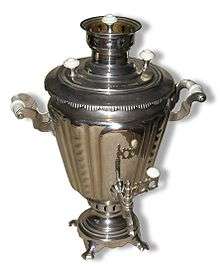samovar
English

A conical urn-shaped silver-plated samovar
Etymology
From Russian самова́р (samovár, “self-boiler”); from само́ (samó, “self”) + вари́ть (varítʹ, “"to boil" or "to cook"”)
Noun
samovar (plural samovars)
- A metal urn with a spigot, for boiling water for making tea. Traditionally, the water is heated by hot coals or charcoal in a chimney-like tube which runs through the center of the urn. Today, it is more likely that the water is heated by an electric coil.
- 1919, Ronald Firbank, Valmouth, Duckworth, hardback edition, page 107
- Come on now with the samovar - and make haste sorting the letter-bag.
- 1932, Maurice Baring, chapter 20, in Friday's Business:
- Eurydice pointed to the cupboard, and sat down on the low divan with folded hands, and looked at the floor. […] Elsa made her drink a glass of vodka. Then she fetched the samovar from the kitchen, and made tea.
- 1919, Ronald Firbank, Valmouth, Duckworth, hardback edition, page 107
Translations
metal urn with a spigot, for boiling water for making tea
|
|
Azerbaijani
Declension
Declension of samovar
| singular | plural | |
|---|---|---|
| nominative | samovar | samovarlar |
| definite accusative | samovarı | samovarları |
| dative | samovara | samovarlara |
| locative | samovarda | samovarlarda |
| ablative | samovardan | samovarlardan |
| definite genitive | samovarın | samovarların |
Possessive forms of samovar
| nominative | ||
|---|---|---|
| singular | plural | |
| mənim (“my”) | samovarım | samovarlarım |
| sənin (“your”) | samovarın | samovarların |
| onun (“his/her/its”) | samovarı | samovarları |
| bizim (“our”) | samovarımız | samovarlarımız |
| sizin (“your”) | samovarınız | samovarlarınız |
| onların (“their”) | samovarı or samovarları | samovarları |
| accusative | ||
| singular | plural | |
| mənim (“my”) | samovarımı | samovarlarımı |
| sənin (“your”) | samovarını | samovarlarını |
| onun (“his/her/its”) | samovarını | samovarlarını |
| bizim (“our”) | samovarımızı | samovarlarımızı |
| sizin (“your”) | samovarınızı | samovarlarınızı |
| onların (“their”) | samovarını or samovarlarını | samovarlarını |
| dative | ||
| singular | plural | |
| mənim (“my”) | samovarıma | samovarlarıma |
| sənin (“your”) | samovarına | samovarlarına |
| onun (“his/her/its”) | samovarına | samovarlarına |
| bizim (“our”) | samovarımıza | samovarlarımıza |
| sizin (“your”) | samovarınıza | samovarlarınıza |
| onların (“their”) | samovarına or samovarlarına | samovarlarına |
| locative | ||
| singular | plural | |
| mənim (“my”) | samovarımda | samovarlarımda |
| sənin (“your”) | samovarında | samovarlarında |
| onun (“his/her/its”) | samovarında | samovarlarında |
| bizim (“our”) | samovarımızda | samovarlarımızda |
| sizin (“your”) | samovarınızda | samovarlarınızda |
| onların (“their”) | samovarında or samovarlarında | samovarlarında |
| ablative | ||
| singular | plural | |
| mənim (“my”) | samovarımdan | samovarlarımdan |
| sənin (“your”) | samovarından | samovarlarından |
| onun (“his/her/its”) | samovarından | samovarlarından |
| bizim (“our”) | samovarımızdan | samovarlarımızdan |
| sizin (“your”) | samovarınızdan | samovarlarınızdan |
| onların (“their”) | samovarından or samovarlarından | samovarlarından |
| genitive | ||
| singular | plural | |
| mənim (“my”) | samovarımın | samovarlarımın |
| sənin (“your”) | samovarının | samovarlarının |
| onun (“his/her/its”) | samovarının | samovarlarının |
| bizim (“our”) | samovarımızın | samovarlarımızın |
| sizin (“your”) | samovarınızın | samovarlarınızın |
| onların (“their”) | samovarının or samovarlarının | samovarlarının |
French
Pronunciation
Audio (file)
Further reading
- “samovar” in le Trésor de la langue française informatisé (The Digitized Treasury of the French Language).
Portuguese
Serbo-Croatian
This article is issued from
Wiktionary.
The text is licensed under Creative
Commons - Attribution - Sharealike.
Additional terms may apply for the media files.